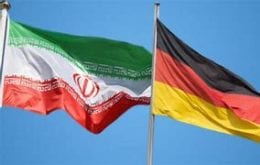
HBO’s epic miniseries Chernobyl is quickly gaining fans around the world, including in Iran, where an adviser to President Hassan Rohani has suggested that it carries lessons for political leaders.
The five-part series has been widely praised for its dramatization of the world’s worst civilian nuclear disaster, including portrayals of victims sacrificing themselves to prevent an even greater catastrophe following an explosion at the Soviet-built power plant in 1986.
The adviser, Hesamedin Ashena, who also heads the presidential research arm known as the Center For Strategic Studies, on June 4 highlighted the joint U.S./U.K. production’s central theme — “What is the cost of lies?” — and said “those in politics and government” could learn from that “mind-boggling question.”

تماشا و عبرت گرفتن از مینیسریال چرنوبیل برای اهالی سیاست و دولت و حکومت بسیار مناسب است.
عصارهاش این سوال تکاندهندهاست.
What is the cost of lie?6051:39 PM – Jun 4, 2019Twitter Ads info and privacy152 people are talking about this
Ashena did not elaborate.
He appeared to have Iranian politicians in mind, since he posted his tweet in Persian. Ashena routinely tweets in English when directing his comments toward Westerners.
In a separate tweet, he shared an HBO promotional image for Chernobyl.
The show appears to be reaching Iranians who, despite restrictions that include tough Internet filtering and censorship as well as U.S. financial sanctions, are usually quick to access the latest Hollywood and Western movies and TV series.
Several episodes have already appeared online dubbed or subtitled into Persian.
When asked by another Twitter user whether he had downloaded the series or has an HBO subscription, Ashena cited the Filimo.com portal, a video-on-demand app that makes Iranian and Western movies and TV shows available to customers.
Not Often Discussed
There has been little public debate within Iran’s state or semiofficial media about the safety of the country’s nuclear facilities, although some Iranians have used open letters, blogs, and social media to question the need for a nuclear program or warn about the potential health or environmental risks of nuclear energy./**/ /**/ /**/ SEE ALSO:
Exiled Iran Religious Scholar Calls For Debate On Nuclear Safety
In 2012, comments by an Iranian health official who had expressed concerns about nuclear health hazards and suggested that there had been “accidents” at one of the country’s nuclear sites were quickly removed from the website of a semiofficial news agency.
Iranian officials have said their facilities have been designed and built based on the latest state-of-the-art technology and don’t pose a threat to the environment or people.
They have also maintained that the Russian-built Bushehr nuclear reactor that went online in southern Iran in 2011 is safe and build to withstand earthquakes up to magnitude 8. Earthquakes are a frequent occurrence in Iran.
Rekindled Debate
HBO’s miniseries appeared to rekindle a debate about nuclear safety among Iranians.
“If this happens in Iran, would our health system be ready to handle so many irradiated patients?” a user who claims to be a physician tweeted from Tehran.
In a reference to Iranian defiance at Western criticism of its contentious nuclear program, the same user reminded those who repeat the state-promoted slogan of “nuclear energy is our absolute right” not to forget Chernobyl.

The HBO miniseries has shone a bright light on Soviet attempts to cover up the scale of the Chernobyl disaster.
Some Iranians on social media said that scenario was all too familiar for Iranians living in an ideologically driven system that frequently silences critics under the pretext of national security or to avoid grim accounts of life in Iranian society.
Iran has steadfastly insisted its nuclear efforts are strictly for civilian purposes, but the U.S. and other governments as well as the International Atomic Energy Agency (IAEA) have accused Tehran of duplicity and stonewalling about its nuclear activities.
International fears that Iran was seeking a nuclear bomb-making capability led to a deal between world powers and Tehran in 2015 that the United States has since abandoned in favor of renewed sanctions and other economic and diplomatic pressure.
 Shabtabnews In this dark night, I have lost my way – Arise from a corner, oh you the star of guidance.
Shabtabnews In this dark night, I have lost my way – Arise from a corner, oh you the star of guidance.


